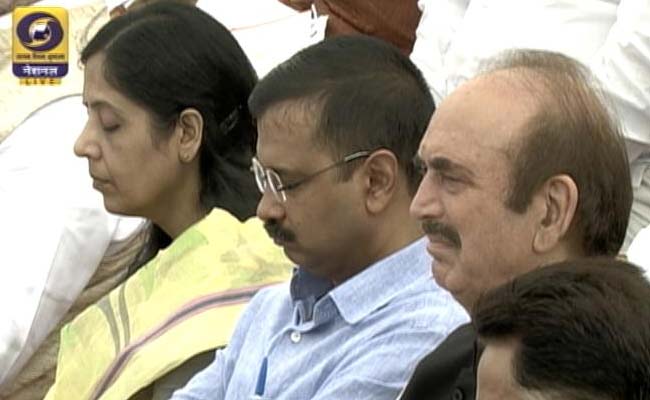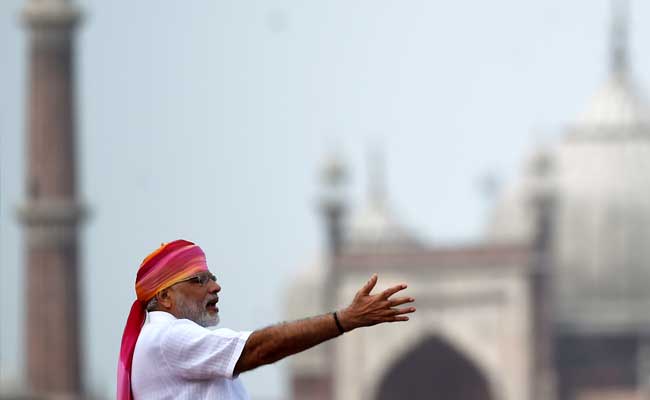So what happened on Independence Day? Why did the 90 minutes of Modi's big Red Fort speech sound so little like the Modi we have come to expect? It's no surprise that the camera supposedly caught Arvind Kejriwal, Arun Jaitley and Manohar Parrikar napping during the speech - though those camera stills are notoriously deceptive. They wouldn't have been the only ones. About 80 minutes in to Modi's dreary repetition of his "accomplishments", I think the audience would have gladly re-elected Manmohan Singh by acclamation as long as poor MMS promised to not talk for another 10 years.

Delhi Chief Minister Arvind Kejriwal was filmed dozing during PM Modi's address at Red Fort
This speech had few of those rhetorical flourishes. Praise of India and its history was kept to a minimum. There was no unifying and uplifting vision. The pracharak's sermon on social issues was absent. The only real moment of political interest and sheer emotional connection came right at the end, with the "Bharat Mata ki Jai" chants - has that happened for the first time, or are we just more sensitive to it now? - and the "Jai Hind" almost as an afterthought.
And of course towards the end of the speech Modi got only his second real and sustained bit of applause - we'll talk about the first sustained applause line in a minute - when he thanked the leaders of Gilgit-Baltistan and Balochistan for their support. That was certainly a startling addition to an Independence Day speech - does it reflect an entirely new approach to Pakistan, or was it just pique over Pakistan's latest statement on Kashmir? - and a little bit of Pakistan-bashing is pretty much the only thing that can fire up an Indian audience sitting in the hot sun, 85 minutes in,
This was a different speech because this is a different Modi. This Modi is unsure of the way forward. He is under-confident, not over-confident. He has been pushed by circumstances into altering his plans for his first five years in office, and it shows. He is alarmed by constant reports of disappointment with his governance in the areas he most needs to win in 2019. This speech was not up to Modi's usual standards, because it was defensive. It was like watching Sehwag trying to pad the ball away for 90 minutes.

PM Modi delivering his Independence Day speech at Red Fort in New Delhi on August 15
But this was less a Modi presenting a report card of his achievements, and more a Modi defensively trying to persuade the electorate that things were indeed changing, even if they hadn't really noticed it yet. It isn't a surprise that the first sustained real bit of applause audible on Doordarshan came when he mentioned it was easier to book railway tickets online now, because that is something that the audience had indeed noticed for themselves.
The defensive nature of the speech was also why it felt slightly disjointed. It seemed comprised of disconnected little sections - this bit addressed to farmers, this bit to young people, and so on. He felt the need it seemed to cover all the bases and address specific groups rather than the country at large. This again appeared under-confident and gave the impression of a speech written by committee (every Secretary to the government sending in two paragraphs?) rather than one which had the PM's stamp all over it, as many of his more extemporaneous ones do.
The section on prices seemed particularly defensive and unpersuasive. That wasn't surprising. After all, news had just come in last week that inflation was at a two-year high. How do you deal with that fact? A Prime Minister can hardly assure the people that prices are not, in fact, increasing at 6 percent when they are. They know this better than he does.
And that's the basic problem with Modi playing defence like this. I find it difficult to believe that a politician can tell the electorate that things are swiftly getting better will be believed unless the electorate sees evidence for that themselves. Modi is at his best spinning a poetic vision of the future, less so prosaically defending considerably more limited accomplishments.
Either way, it's clear now that the government is in election more. The Uttar Pradesh elections are ever closer; and once they're done, there's Gujarat, and then we're into the run-up to 2019. We had better prepare for endless defences of the Modi record. Still, there's good news in there too. At least it seems the Prime Minister has decided to defend his development record rather than give that up as too difficult to win a second mandate with and switch to something else.
(Mihir Swarup Sharma is a fellow at the Observer Research Foundation.)
Disclaimer: The opinions expressed within this article are the personal opinions of the author. The facts and opinions appearing in the article do not reflect the views of NDTV and NDTV does not assume any responsibility or liability for the same.


